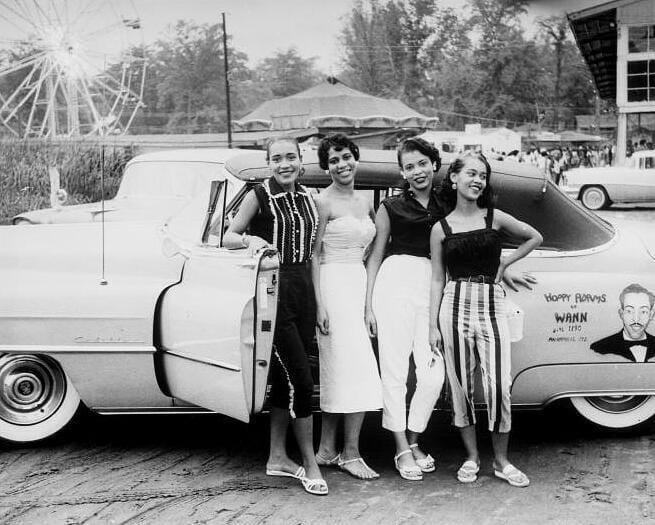- BlackVoter.Org
- Posts
- BlackVoter.Org
BlackVoter.Org

New Orleans is preparing to honor the 20th anniversary of Hurricane Katrina with a heartfelt commemoration filled with memorials, performances, and a vibrant parade. On August 29, thousands will gather in the Lower Ninth Ward, where the storm’s effects were devastating, to pay tribute to those affected by the disaster.
A symbolic wreath-laying at a memorial for unidentified victims, a minute of silence, and moving speeches from survivors will be part of the day's events, which highlight both resilience and the need for ongoing attention to the city’s infrastructure and climate vulnerabilities. The commemoration's centerpiece will be a spirited second line parade, a cherished New Orleans tradition that celebrates community togetherness.
As attendees reflect on the lasting impact of Katrina, including the challenges faced by displaced residents, they reaffirm their commitment to a more inclusive and sustainable future for the city.

In the era of Donald Trump's authoritarian regime, the struggle for restorative rest has taken on new meaning, especially for Black Americans and marginalized communities. As harmful policies chip away at essential resources—like food assistance, healthcare, and funding for historical Black colleges—adequate sleep becomes less about relaxation and more about survival.
Congressman Bennie Thompson highlights how Trump’s actions dismantle vital support systems, leaving over 11 million Black families vulnerable. Scientific research links poor sleep to serious health issues, which are exacerbated by the stress stemming from political oppression.
The constant battle for basic wellness underlines a broader struggle for justice, making each moment of rest an act of resistance. In today’s landscape, sleep is not just a personal need; it is intertwined with the fight for dignity and equality for those facing systemic disadvantages.
In this precarious climate, the quest for health and rest illustrates the resilience of the human spirit.

In a pivotal legal challenge, the Supreme Court is contemplating significant changes to the Voting Rights Act (VRA) of 1965, potentially undermining its core provisions. Louisiana is pushing to eliminate race considerations in redistricting, arguing that the existing VRA framework violates constitutional amendments.
This move coincides with various civil rights groups and Black voters advocating for a more equitable congressional map, which aims to establish a second majority-Black district in Louisiana. The state’s previous map had been deemed discriminatory for diluting Black voting power.
As the Court prepares for reargument in October 2025, the outcome could drastically reshape voting rights, particularly affecting Black-majority districts in GOP-controlled Southern states. With hints of a possible ruling against the VRA's Section 2, there's growing concern about the future of voting representation for marginalized communities, as the Court weighs whether racial considerations in political maps still hold relevance in today's society.

In a surprising move, President Donald Trump has revoked former Vice President Kamala Harris' Secret Service protection, a decision that has sparked major concerns among security experts and Democratic leaders alike. Although typical protection lasts six months post-office, Harris had her security extended after Joe Biden signed a directive at her request.
The revocation comes just as Harris prepares for a nationwide book tour promoting her memoir, "107 Days," reflecting on her brief presidential campaign. Trump's decision has drawn ire from officials like Los Angeles Mayor Karen Bass, who deemed it politically retaliatory and a threat to Harris's safety.
This development underscores the tense political atmosphere and raises questions about continuity of protection, especially for public figures facing potential risks in an increasingly polarized climate. As speculation about Harris's future political ambitions grows, the implications of this security withdrawal are bound to resonate throughout the political landscape.

Dive into the rich history of Elktonia-Carr's Beach, a once-thriving haven for Black families and artists nestled along the Chesapeake Bay. This cherished spot, acquired by a formerly enslaved veteran, became a significant resort during the Jim Crow era, hosting legendary musicians like Billie Holiday and Chuck Berry.
Amidst ongoing efforts for historical preservation, the site recently transitioned into a public park, ensuring that its vibrant legacy is celebrated rather than forgotten. Led by passionate advocates, including the late Vince Leggett, the movement aims to protect and highlight African American contributions to the Chesapeake's maritime history.
Elktonia Beach represents more than just a location; it's a testament to resilience and a calling to remember and preserve the stories that shape our culture. Discover how this initiative fosters appreciation for Black history and inspires future generations to cherish and save these pivotal sites.

The White House has stirred up significant controversy by appointing Jim O'Neill, a deputy to Robert F. Kennedy Jr.
, as the acting head of the CDC. This decision follows the abrupt firing of CDC director Susan Monarez, whose three-week tenure raised eyebrows.
Senators are aghast, with some calling for congressional oversight and expressing their alarm at Monarez's dismissal, citing her strong scientific pedigree. O'Neill, lacking a medical background and having previously served as a speechwriter under George W.
Bush, is expected to support Kennedy’s agenda to reshape U.S.
vaccine policy. This turmoil has prompted notable resignations from senior CDC officials protesting political meddling in public health.
The health agency is now facing calls to focus on scientific integrity over political influence amidst a broader backdrop of political and public health conflicts under the Trump administration.

Althea Gibson made waves 75 years ago as the first African American to compete at Wimbledon, breaking barriers and reshaping the tennis world. Her groundbreaking achievements not only paved the way for future generations of athletes of color but also served as a beacon of hope during a tumultuous time in American history.
Gibson’s extraordinary talent saw her clinch both the Wimbledon singles and doubles titles in 1957, making her a force to be reckoned with on the court. Behind her success and fierce determination was a story of resilience, challenging societal norms, and championing equality in sports.
Today, Althea Gibson is celebrated not just for her athletic prowess, but also for her enduring legacy in the fight for civil rights and representation in athletics. Her journey is a powerful reminder of the impact one person can make in the world of sports and beyond.